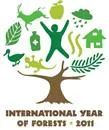This New Year is special in one way because the United Nations has declared 2011 as "The International Year of Forests".
2011 International Year of Forests. This logo is property and Copyright of the United Nations
Above is the logo, which was designed to convey the theme of “Forests for People”.
Patagonia, as you know, is not only the dry steppe that begins just to the east of the Andes and spans the continent up to the Atlantic Ocean. No, it also has a beautiful forest with unique endemic species that covers its western shores along the Pacific Ocean and crossing the incredible Patagonian Andes, also blooms on its eastern flanks.
There is no other forest like it in the whole world. It shares some varieties of trees with Australia, New Guinea and New Zealand, the remnants of an archaic forest that once covered the ancient Supercontinent of Gondwana, and whose fossilized remains can still be seen in Antarctica. Home to many endemic species of mammals, fish and amphibians, it is also home to Patagonia's mysterious cryptids.
Logging, hydroelectric power plants, mining and climate change are the main threats to its integrity and survival.
Forests are something that we, people should look after and make sure that they are sustainably managed and that our governments ensure that they are conserved and developed in a rational way.
As the UN website states: "forests provide shelter to people and habitat to biodiversity; are a source of food, medicine and clean water; and play a vital role in maintaining a stable global climate and environment. All of these elements taken together reinforce the message that forests are vital to the survival and well being of people everywhere, all 7 billion of us".
What a number: seven billion humans. Perhaps too many of us for old mother earth to sustain! How can we (in a reasonable, democratic and humane way) reduce our growth rate and aim at a lower population level? Education is the key: educated people tend to have less children. Developed countries should urge less developed countries to invest more in education. A long term bet, but one that will ensure a better future for all human beings.
So I thought that it would be a nice way to begin the year, a year that follows the 2010 International Year of Biodiversity.
More information visit the UN official website for 2011 International Year of Forests.
Happy New Year!
Patagonian Monsters - Cryptozoology, Myths & legends in Patagonia2011 International Year of Forests Copyright 2009-2011 by Austin Whittall ©

No comments:
Post a Comment